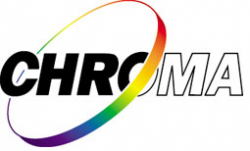

Chroma Technology Corp

Vermont, United States
May 2013
Other manufacturing
Manufacturing
China,
Germany,
Japan,
United States
As a 100% employee-owned company dedicated to customer service and satisfaction, Chroma has always been committed to serving and working closely with the scientific community and industry. A broad portfolio of product offerings span applications such as fluorescence microscopy, flow cytometry, spectroscopy, DNA sequencing, medical and surgical devices, astronomy, metallography, machine vision, manufacturing and security. Chroma manufactures filters using high-performance sputtered coatings as well as various evaporative coating processes. Filter types include single and multi-bandpass, notch, and long and shortpass filters as well as dichroic and polychroic mirrors, beamsplitters and optics for use in the most demanding applications. Chroma specializes in providing filters offering precise spectral control and exceptionally high signal-to-noise ratios, with rapid cut-on and cut-off profiles. Their manufacturing process utilizes the highest quality substrates and materials and proprietary technologies. For critical applications requiring very high quality reflective surfaces, Chroma offers Ultra-Flat dichroics with the highest degree of flatness in the industry.
Overall B Impact Score
Governance 12.9
Governance evaluates a company's overall mission, engagement around its social/environmental impact, ethics, and transparency. This section also evaluates the ability of a company to protect their mission and formally consider stakeholders in decision making through their corporate structure (e.g. benefit corporation) or corporate governing documents.
What is this? A company with an Impact Business Model is intentionally designed to create a specific positive outcome for one of its stakeholders - such as workers, community, environment, or customers.
Workers 60.0
Workers evaluates a company’s contributions to its employees’ financial security, health & safety, wellness, career development, and engagement & satisfaction. In addition, this section recognizes business models designed to benefit workers, such as companies that are at least 40% owned by non-executive employees and those that have workforce development programs to support individuals with barriers to employment.
What is this? A company with an Impact Business Model is intentionally designed to create a specific positive outcome for one of its stakeholders - such as workers, community, environment, or customers.
Community 14.0
Community evaluates a company’s engagement with and impact on the communities in which it operates, hires from, and sources from. Topics include diversity, equity & inclusion, economic impact, civic engagement, charitable giving, and supply chain management. In addition, this section recognizes business models that are designed to address specific community-oriented problems, such as poverty alleviation through fair trade sourcing or distribution via microenterprises, producer cooperative models, locally focused economic development, and formal charitable giving commitments.
Environment 9.1
Environment evaluates a company’s overall environmental management practices as well as its impact on the air, climate, water, land, and biodiversity. This includes the direct impact of a company’s operations and, when applicable its supply chain and distribution channels. This section also recognizes companies with environmentally innovative production processes and those that sell products or services that have a positive environmental impact. Some examples might include products and services that create renewable energy, reduce consumption or waste, conserve land or wildlife, provide less toxic alternatives to the market, or educate people about environmental problems.
Customers 3.9
Customers evaluates a company’s stewardship of its customers through the quality of its products and services, ethical marketing, data privacy and security, and feedback channels. In addition, this section recognizes products or services that are designed to address a particular social problem for or through its customers, such as health or educational products, arts & media products, serving underserved customers/clients, and services that improve the social impact of other businesses or organizations.